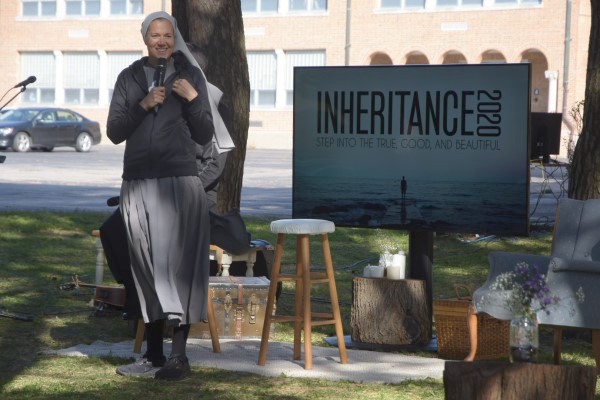
Sr. Miriam James Heidland, SOLT, speaks during the Inheritance 2020 Conference on Saturday, Oct. 10. (Photo by Nick Son)
Inheritance 2020 was a different kind of conference — but then, it’s also a very different kind of world. But for all its departures from the norm, the weekend offered its attendees — both those who gathered on blankets in “the grove” outside St. Monica Rectory in Whitefish Bay and those who watched at home via YouTube — an encounter with someone who never changes.
“Originally when we were envisioning Inheritance 2020, we had all these big dreams,” said Pete Burds, director of young adult ministry for the Archdiocese of Milwaukee. “Like many of our big dreams in 2020, we had the rug pulled out from under us. But the Lord still makes a way. We’re here, in the midst of a pandemic. It’s such a great gift to be here.”
Co-sponsored by the Archdiocese of Milwaukee and Brew City Catholic, Inheritance 2020 began the evening of Friday, Oct. 9, and ran through the following day, concluding with Mass on Saturday afternoon.
“Isn’t it just nice to be together again?” said Sr. Miriam James Heidland, SOLT, who co-headlined the conference with Fr. John Burns. “We’ve kind of been apart for a long time, and it’s just nice to be together.”
The Inheritance conference is offered annually for young adults in their 20s and 30s who are searching for all that is “true, good and beautiful.” This year’s version called for social distancing due to the threat of COVID-19, as well as a completely outdoor venue except for Mass and adoration. Those took place in St. Monica, one of the largest-capacity churches in the archdiocese.
The themes of faith, hope and love permeated the weekend — virtues that can often seem especially rare and especially precious in today’s world, said Fr. Burns.
“The fact that the Kingdom of God is here — we know that’s a truth. But we look around today in the world that we’re living in and the first question that comes to my mind is, ‘Yeah? where?’” he said. “Where is the Kingdom of God? How is that here, in the context of everything going on in this crazy year?”
For so many people, 2020 was set up to be the perfect year, he said.
“2020 is by no means what we thought it would be, but maybe we could be willing to actually in the mess discover that what Jesus is trying to do is help us see perfectly,” he said. “And maybe a part of the word to us in this crazy time is that we haven’t been seeing very well — really seeing.”
And what are we seeing when we look around? “It seems like the only thing we see is people yelling at each other,” Fr. Burns added. “And then when we look at our own stories in this past year, we see life not being what we wanted, and we feel ourselves kind of yelling … ‘What’s wrong with this world, what’s wrong with my heart, what’s wrong with everything?’”
But what we need to remember, he said, is that our world is not so different than the one Jesus was born into.
“When Jesus came into the world, it was because there was something very, very wrong,” he said. “And the power of our faith is the knowledge that Jesus is perpetuated. Christ is always coming into the world that is so much in need, in order to help us see better. To see what’s actually supposed to occupy our attention, our minds, our hearts.”
“Many of us have grown up Catholic or we’ve grown up believers and we have an idea of what we think life is,” Sr. Miriam said. “And when we talk about faith, it can almost seem like a theoretical concept. We say, Lord, I don’t have enough faith; increase my faith.”
But faith, she said, “Isn’t a philosophy. It isn’t an ideology. It’s an encounter with a person. And that person is alive.”
Accepting any gift requires vulnerability, she pointed out — and so it goes with the gift of Jesus Christ. “All of us in life have gifts that we have received in ourselves and gifts we have pushed away,” she said. “Where do you find it challenging to receive Christ himself? All of us have fragmented parts. Many times we push those parts away, we exile them far, far away. And Jesus comes to sit there and he comes to bring you and I to communion.”
Burds applauded the speakers for not only “beautifully breaking open the theological virtues of faith, hope and love” on a philosophical level, but also for providing “practical application (of the virtues) in the uniqueness of a pandemic.”
“Everyone seemed to be really challenged by the message and encouraged in their journey with Christ,” he said.
